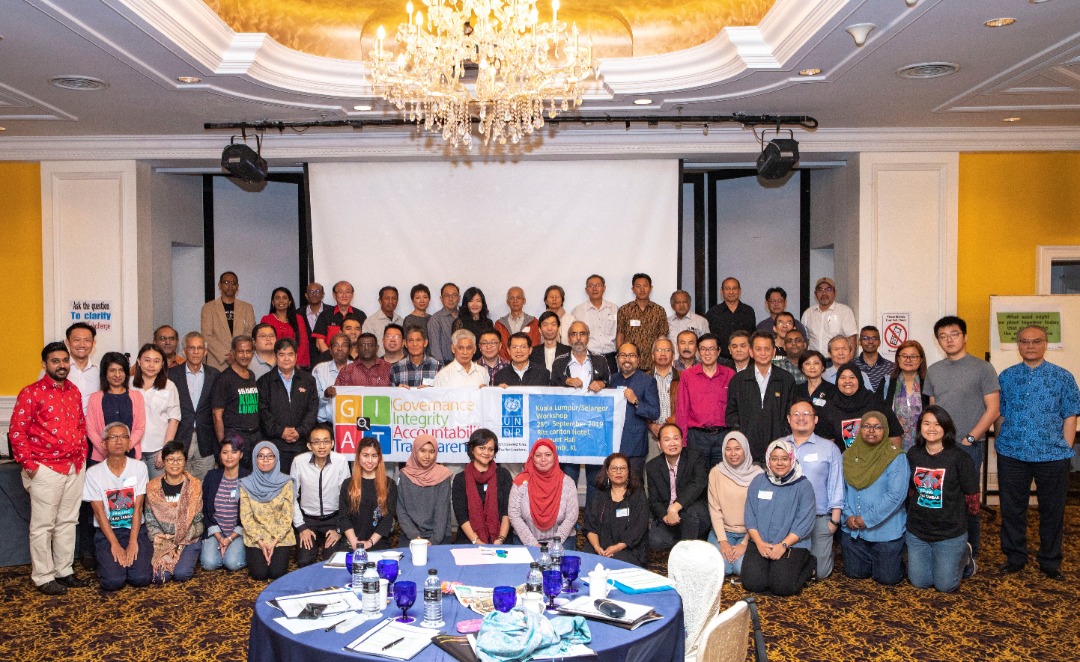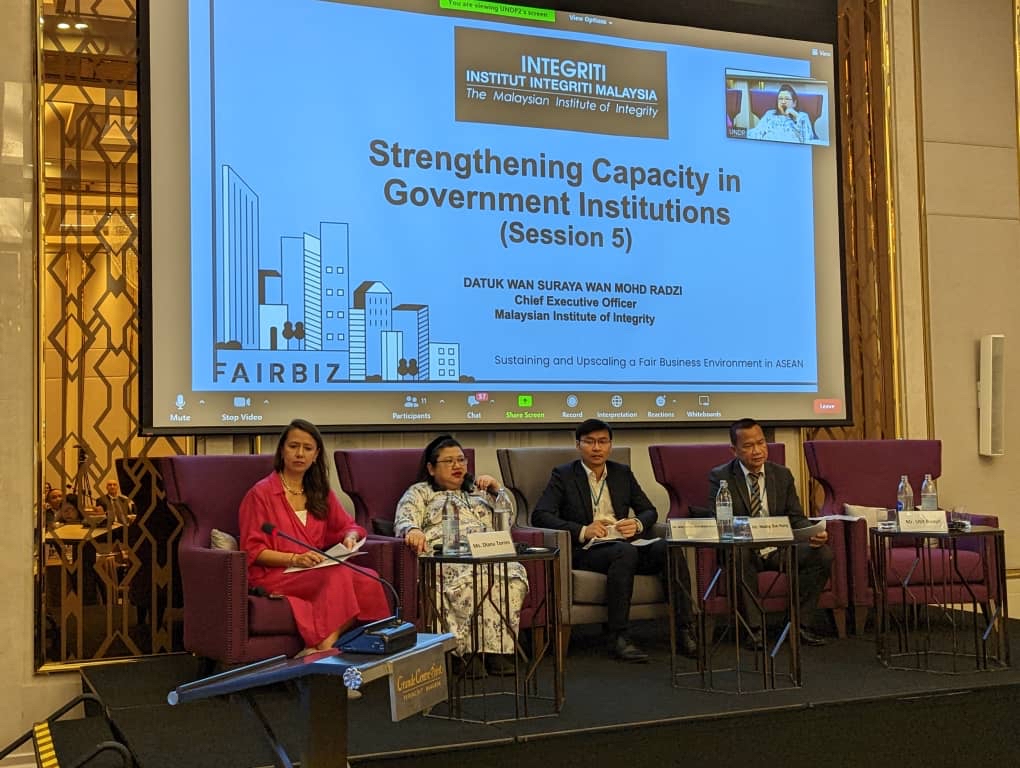Tackling anti-corruption on a global and national scale requires multi-stakeholder cooperation. What can we learn from UNDP’s recent initiatives?
Reflections: Four Lessons for Malaysia on Anti-Corruption
December 26, 2022
By: Aisyah Razihan, Governance Assistant, UNDP Malaysia, Singapore & Brunei Darussalam
Malaysia's development challenges are intensifying amidst increasing societal polarisation and a volatile environmental climate. Solving these complex challenges will require resources—especially financial—to be mobilised efficiently. Thus, we can no longer afford to tolerate corruption as it is financially and socially costly. In 2018, it was estimated that around USD 2.6 trillion, or 5% of the global gross domestic product was lost due to corruption[1]. Noting that poor governance and corruption are major bottlenecks for human development, successive governments in Malaysia have upheld a pledge to anti-corruption.
Ordinary Malaysians unite against corruption and demand good governance.
To ensure that efforts to address Malaysia's converging challenges remain uninterrupted, fighting corruption must remain a priority for Malaysia, requiring strong cooperation between all stakeholders, regardless of the divide and across government cycles. This was evident in the recently held 15th General Elections, where the various coalitions contested all pledged anti-corruption initiatives in their respective manifestos [2].
Here are four recommendations based on UNDP's initiatives in supporting anti-corruption efforts in Malaysia.
In Malaysia, UNDP carried out anti-corruption initiatives through the Promoting a Fair Business Environment in Malaysia (FairBiz) project and a grant from the UNDP Seoul Policy Centre (
1. Include CSOs in the implementation and monitoring of national plans and policies.
Following Malaysia’s National Anti-Corruption Plan (NACP), a new ‘good governance’ strategy is targeted to be developed by 2023 [1], which will be widely implemented across all government agencies, including statutory bodies.
Under the broad reach of the new strategy, CSOs can play a crucial role in supporting the implementation and monitoring of the plan's progress, especially at the local level. Through a partnership with GIAT (Governance, Integrity, Accountability and Transparency) Coalition in 2019, UNDP supported a series of workshops with local-level CSOs to build their organisational capacity to conduct effective anti-corruption initiatives [2]. These workshops showcased the depth of the participating CSOs' knowledge and skills in identifying issues surrounding governance and corruption matters in their constituency. Given the right platform and resources, these CSOs can offer valuable insights and technical support for the government to implement and monitor the progress of future national-level plans and strategies.

Figure 1 Participants at the UNDP-GIAT Workshop in KL
2. Leverage multilateral cooperation as a platform for capacity building.
In 2019, UNDP facilitated a knowledge exchange session between Malaysia's National Centre of Governance, Integrity, and Anti-Corruption (GIACC) and the Republic of Korea's Anti-Corruption and Civil Rights Commission (ACRC). The sharing session kick-started UNDP’s Seoul Policy Centre grant initiative that aimed to support GIACC in developing a tool to measure the impact of the NACP, similar to the ACRC's Anti-Corruption Impact Assessment.
In the following months, UNDP facilitated GIACC's study trip to the Republic of Korea to closely learn how to conduct the impact assessment from ACRC. The learning outcome from the trip prompted the development of a measuring mechanism that suited the Malaysian context, namely the Malaysian Governance Indicators (MGI). The MGI was developed by GIACC and UNDP, with support from the FairBiz project.

Figure 2 Knowledge sharing session between GIACC and ACRC, facilitated by UNDP.
Separately, the FairBiz project also offers valuable tools developed through consultations with regional stakeholders to guide the government in developing local anti-corruption solutions. Such tools include Strategic Programming for Anti-corruption Agencies and Building Transparent and Open Public Procurement Systems. From a national positioning perspective, these regional initiatives also provide Malaysia with an international platform to share its achievements and lessons learned with the global community. For example, Datuk Wan Suraya, CEO of Malaysia's Integrity Institute (IIM), an agency under GIACC, was recently invited to share IIM's role in executing anti-corruption and good governance initiatives in a FairBiz Forum held in Bangkok.

Figure 3 Dato' Wan Suraya speaking at a panel session in the FairBiz Forum in November 2022.
3. Reinforce the capacity of Small and Medium Enterprises (SMEs) against corruption.
SMEs are the backbone of Malaysia's economy, contributing 37.4% to Malaysia's GDP in 2021 and providing 7 million job opportunities [5]. In a survey conducted in 2018, the main concern for Malaysian SMEs is the threat of corruption and bribery [6], which increases the risk of financial and reputational implications.
Recognising this, UNDP partnered with two multinational corporations (MNCs) in Malaysia to train SMEs in their local supply chain. The training covered various topics, including human rights, sustainability, international compliance, and corporate governance. The aim is to equip the participating SMEs with the right tools and knowledge to comply with the MACC Act Section 17A.
In the follow-up sessions upon completion of the training, UNDP discovered that a few participating SMEs had changed their business operations. This is a good indicator that SMEs are committed and able to equip themselves against the threat of corporate corruption if given adequate resources and support. Thus, reinforcing the SMEs' resiliency against corruption will yield longer-term benefits for Malaysia's corporate governance ecosystem.
4. Nurture the potential of youth as changemakers, through education.
In the NACP, the capacity development of public officials through improved education and professional development is listed as a key target (Strategic Objectives 2.4). To attain this target, UNDP and GIACC co-developed a leadership training module for public officers that enhances the understanding of good governance values and policies. A similar education framework has the potential to be emulated by Malaysia’s youth to nurture a generation that embodies the principles of good governance. The potential of youth as a changemaker should be tapped and encouraged through the education system. This method will empower the youth to recognise corruption and to act with integrity, as well as be able to demand accountability from leaders and decision-makers.

Figure 4
Eradicating corruption requires a united front.
This year's International Anti-Corruption Day (IACD) theme is "Uniting the World Against Corruption. Decision-makers and high-level stakeholders should emulate the same spirit by strategically cooperating and remaining united in the fight against corruption. In a world with increasingly complex challenges and crises, we can no longer be complacent against graft.
[1] https://press.un.org/en/2018/sc13493.doc.htm
[4] https://www.malaysiakini.com/news/49412
[5] https://www.dosm.gov.my/v1/index.php?r=column/cthemeByCat&cat=159&bul_id=aFRNc2Zid295Tm1yczN5dWJNS1NwQT09&menu_id=TE5CRUZCblh4ZTZMODZIbmk2aWRRQT09
[6] Understanding fraud in Malaysian SMEs (Sow, et. al., 2018)

 Locations
Locations


